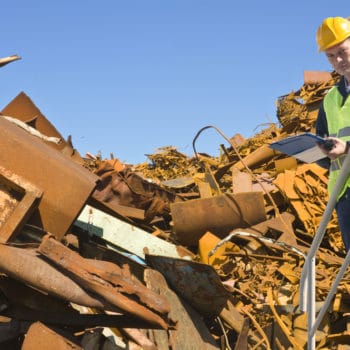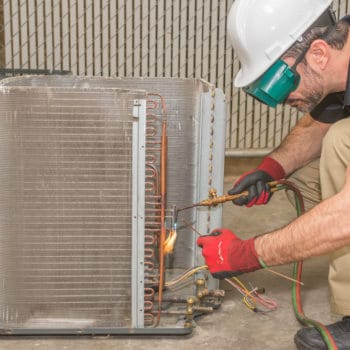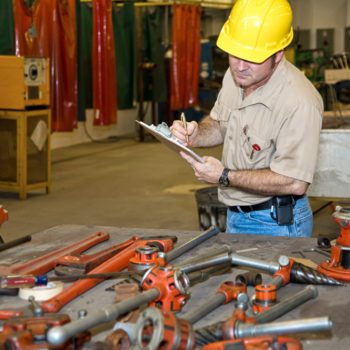Why We Love It
-
$55,760Potential Avg. Salary
-
0.5%Job Growth Rate
-
Growing DemandJob Outlook
-
Skill-Based WorkCareer Attribute
Valve Technicians are responsible for the installation, repair and hands-on maintenance of control valves, actuators and other mechanical governors. Valve technicians are expected to have a broadened perspective of control valve performance and troubleshooting problems with the aim of keeping residential and commercial properties secure and running with correctly operated electric meters, gas regulators, thermostats, and so on.
Recommended Schools
What is a Valve Technician?
A valve technician has to handle a wide variety of responsibilities and duties such as those listed below:
- Perform the disassembly and repair of mechanical control devices like valves and actuators such as thermostats, hydrants and regulators with the use of hand tools and power tools.
- Monitor and keep track of meter readings and installation data on meter cards, work orders, or field service orders, or enter data into hand-held device for generating service reports.
- Make an assessment of individual components of the control valves or mechanical control device parts for defects, dents, or malfunctioning areas and bring to supervisor’s notice for urgent action.
- Measure tolerances of assembled parts of valves and actuators, for compliance with standards and regulations, using tools like gauges and calipers.
- Install and run tests on electric meters and power sources to monitor and detect possible causes of malfunctions, with the use of hand tools and other testing equipment.
Day in the life
On a day-to-day basis, valve technicians are responsible for turning meters on or off to establish or shut down service. They regulate the air pressure in control valves or devices at specified flow rates. The technician also has to report any hazardous work situation, such as faulty meters or systemic failures.
The role might also involve connecting regulators to test stands and adjusting screws until the gauges indicate inlet/outlet pressure in compliance with established standards. Those working with larger organisations, must have the a bility to use applications like Microsoft Word, Excel, and Outlook to create service reports and communicate with senior officials regarding test results, usage of material resources and recorded repairs.
Work schedule and typical hours
Work hours for a valve technician varies based on whether the position is contract or full-time but one can expect to work around 40 hours per week. A valve technician should be comfortable working in conditions that are consistent with a manufacturing and service organization.
Work environments can differ from a workshop to on-site at a heavy industry facility like a factory or warehouse. Occasional travel to the job site will also be a factor that determines a valve technician’s work schedule.
Growth of the job
Control and Valve Installers and Repairers, Except Mechanical Door held about 41,000 jobs across the U.S. in 2013. The U.S. Bureau of Labour Statistics projects that employment opportunities in this career field will see little or no change from 2014 to 2024.
The projected growth in placements and available positions is expected to be 13,800. Candidates who are computer literate and have an advanced understanding of valve diagnostics will find good job opportunities versus other competitors.
Typical employers
A variety of public and private sector organisations look to hire a valve technician. Valve technicians are needed in industries like oil and gas, petrochemicals and chemicals, electronics and telecommunications, manufacturing and construction, building contractors services, hospitals, electrical power generation and distribution services. They are also required by educational institutions that maintain large campuses for regulating all control devices. Many companies offer a decent benefits package apart from competitive salary – including medical, dental, vision, life insurance, short term and long term disability, 401(k) and much more.
Recommended Schools
How To Become a Valve Technician
Although no formal higher education is needed for job positions in industrial valve repair, apprenticeships and trade school programs are available to build foundational skills for the technical side of this job. Journeyman level with Trade School diploma / certification or equivalent years of experience is mostly acceptable.
Experience is prioritized in this sector, such as four years of technical field experience in turbine or valve repair. Competence and knowledge in the use and operation of specific shop machine equipment can always give an advantage over other potential candidates, such as the lathe, drill press, cut-off saw, vertical & horizontal mills, etc. Understanding process hazards and being able to prioritize workload to maximize efficiency is also a bonus.
Some candidates for job opportunities at large-scale companies must pass an initial alcohol and drug test and adhere to all company policies including a Drug and Alcohol Policy for continued employment.
Valve Technician Salary Data
We’ve provided you the following to learn more about this career. The salary and growth data on this page comes from recently published Bureau of Labor Statistics data while the recommendations and editorial content are based on our research.
National Anual Salary
Low Range
$39,150Average
$55,760High Range
$86,140National Hourly Wage
Low Range
$19/hrAverage
$27/hrHigh Range
$41/hrHow do Valve Technician salaries stack up to other jobs across the country? Based on the latest jobs data nationwide, Valve Technician's can make an average annual salary of $55,760, or $27 per hour. This makes it an Above Average Salary. On the lower end, they can make $39,150 or $19 per hour, perhaps when just starting out or based on the state you live in.
Salary Rankings And Facts
#315 Nationally for All Careers
Highest Education Among Valve Technicians
- 0.2% Doctorate
- 0.5% Masters
- 4.4% Bachelors
- 14.2% Associates
- 34.9% College
- 39.7% High School
- 6.2% Less than High School
Job Growth Projections and Forecast
2014 Total Jobs
42,4002024 Est. Jobs
42,600Job Growth Rate
0.5%Est. New Jobs
200How does Valve Technician job growth stack up to other jobs across the country? By 2024, there will be a change of 200 jobs for a total of 42,600 people employed in the career nationwide. This is a 0.5% change in growth over the next ten years, giving the career a growth rate nationwide of Below Average.
Growth Rankings And Facts
#591 Nationally for All Careers
What Companies Employ The Most Valve Technicians
| Industry | Current Jobs | New Jobs Needed | % Increase |
|---|---|---|---|
| Natural gas distribution | 8,200 | -900 | -1% |
| Electric power generation, transmission and distribution | 7,700 | -800 | -1% |
| Local government, excluding education and hospitals | 7,600 | 500 | 0% |













